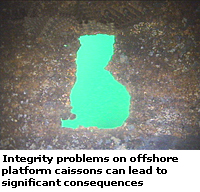iicorr conducts industry-leading research into vital offshore infrastructure
13/11/2009
Integrity, inspection and corrosion specialist iicorr has completed a study into the causes and effects of integrity problems with caissons on offshore platforms through its online Centre of Excellence. iicorr, headquartered in Aberdeen, contacted 20 offshore platform operators/integrity management contractors requesting responses to a survey questionnaire into the problems which affect caissons.
iicorr, headquartered in Aberdeen, contacted 20 offshore platform operators/integrity management contractors requesting responses to a survey questionnaire into the problems which affect caissons.Through its work on caisson inspection and integrity assessment, iicorr recognises that integrity problems on this vital infrastructure are common and can lead to significant consequences, in terms of repair costs, production interruption and subsequent damage to primary structure.
The aim of the survey was to capture data on the true extent of the problem, which caisson types are particularly affected and how the industry is currently working to detect and prevent failures.
The responses to the survey demonstrated the significant consequences of caisson integrity problems, with incidents reported ranging from caissons being out of service through to complete replacements being required, with the resulting cost of each integrity problem estimated at £100,000.
The information gathered provides a valuable overview for the offshore industry. It will also inform iicorr's future service and technology development in this area. Such advances will assist asset operators to detect and, more importantly, prevent serious integrity issues on their production caissons.
The survey covered three main types of caissons on offshore platforms:
- Pump caissons – stilling tubes to pump seawater up to the production areas for injection, cooling or firewater uses.
- Discharge caissons – for storing or draining fluids into the sea, such as water produced during production processes.
- Carrier caissons – structural conduits for risers, umbilicals, cables, etc to provide protection.
A total of 59 recorded integrity problems were identified, the biggest of which was internal corrosion leading to holes forming in the caissons. Interestingly, the study highlighted that the most common inspection technique applied is external visual inspection, which will not detect pre-failure indications of internal corrosion.
There were also 29 incidents reported over the last five years, ranging from caissons being out of service to some requiring complete replacement. The total estimated costs of the 29 incidents is in excess of £7million, while the average cost of the 59 integrity problems was estimated at £100,000 each.
iicorr's Specialist Inspection Services Business Unit Manager Tony O'Shea told NDT News: "The results of the study are extremely valuable to iicorr and operators. They show that using appropriate inspection, monitoring and mitigating techniques to detect and prevent caisson integrity problems can deliver significant added value to asset operators.
"The range of scanning tools operated by iicorr allows for 360º, 100% wall thickness mapping of the subsea section of the caisson. Continuous developments in software data gathering techniques allow iicorr to profile the internal surface of the feature; this provides greater definition of the surface such as pitting and erosion and will identify any sources of internal or external corrosion."
The report is available on www.centreofexcellence.com
The Centre of Excellence is a first port of call for anyone in the industry looking for technical documents and best-practice on future projects involving any kind of integrity work.
The Centre of Excellence also offers the services of a team of experts to provide a quick, responsive, cost-effective resource for the oil and gas industry.
iicorr Technical Director Mark Wilson said: "The caissons research is the first in a planned series of specialist surveys we will complete through our Centre of Excellence. These studies will address particular issues and challenges our business units are working to overcome. The first report highlights very clearly the high cost of integrity issues and the savings that can be generated by stopping problems from happening in the first place."
Mr Wilson added that iicorr has entered into collaboration agreements with a number of UK and international universities to share the knowledge built up on the site. "We are already looking at joint industry projects to encourage valuable research and help equip students with expertise of significant use to industry," he said.
www.iicorr.com